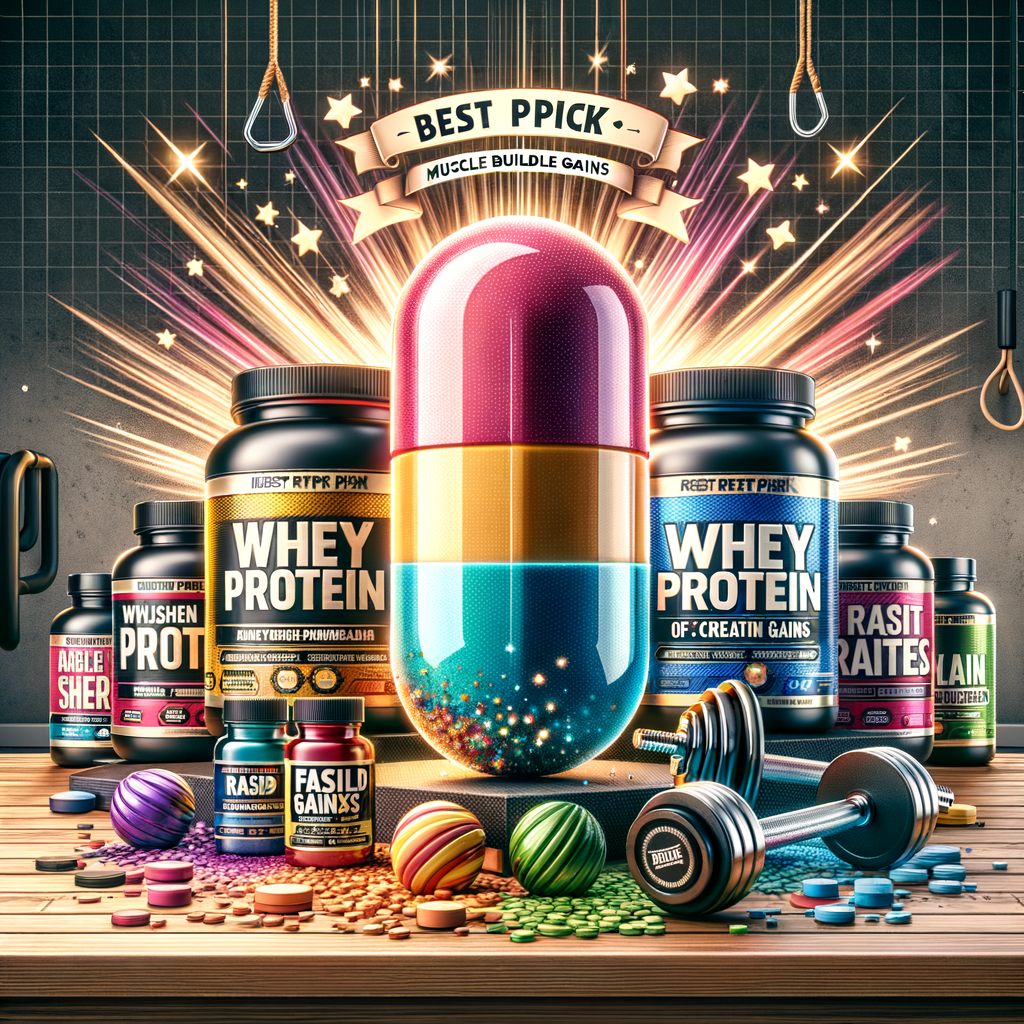- Understanding Muscle Building Supplements
- The Role of Protein in Muscle Growth
- Why Protein Matters
- Daily Protein Requirements
- Best Protein Supplements
- Creatine: The Powerhouse Supplement
- What is Creatine?
- How to Use Creatine
- Benefits of Creatine
- Branched-Chain Amino Acids (BCAAs)
- What are BCAAs?
- Why Use BCAAs?
- Recommended Dosage
- Pre-Workout Supplements: Fueling Your Workouts
- What are Pre-Workout Supplements?
- Key Ingredients to Look For
- Taking Pre-Workout Supplements
- Natural Anabolic Agents
- Understanding Anabolics
- Popular Natural Anabolics
- How to Use These Agents
- Nutrition Matters: The Foundation of Muscle Building
- The Importance of Whole Foods
- Macronutrient Breakdown
- Hydration
- Maintaining a Consistent Workout Routine
- Exercise Variety
- The Importance of Rest
- Tracking Progress
- Supplement Safety and Considerations
- Consultation with a Professional
- Quality Over Quantity
- Conclusion: Choose Wisely for Best Results
- Frequently Asked Questions
- 1. Are muscle-building supplements necessary for everyone?
- 2. What is the best time to take protein supplements?
- 3. Can I take creatine and protein at the same time?
- 4. Are there side effects to taking BCAAs?
- 5. How long does it take to see results from muscle-building supplements?
- 6. Can women use muscle-building supplements?
- 7. Should I take supplements if I’m under 18?
- 8. Which supplement works best for rapid muscle growth?
- 9. Will supplements help me gain weight?
- 10. How do I know which supplement to choose?
- References
Understanding Muscle Building Supplements
When it comes to building muscle, the right nutrition plays a crucial role. While a good diet can do wonders, sometimes it’s not enough to reach your fitness goals. This is where muscle building supplements come into play. These supplements can add that extra boost, helping you pack on muscle more quickly and efficiently.
Muscle building supplements generally fall into several categories, including protein powders, creatine, branched-chain amino acids (BCAAs), and others. Each type has its own benefits and can play a significant role in your overall muscle-building strategy. Understanding these options helps you make informed decisions and tailor your supplementation according to your needs.
The Role of Protein in Muscle Growth
Why Protein Matters
Protein is often called the building block of muscle for a reason. When you engage in resistance training, tiny tears occur in your muscle fibers. Your body repairs these tears using amino acids from protein sources. Therefore, consuming enough protein is vital for recovery and growth.
Daily Protein Requirements
Most experts recommend consuming around 1.6 to 2.2 grams of protein per kilogram of body weight for optimal muscle growth. So, if you weigh 70 kg, aim for about 112 to 154 grams of protein daily. This can come from whole foods or supplements like protein powders.
Best Protein Supplements
1. Whey Protein: This is one of the most popular protein supplements on the market. It gets absorbed quickly, providing your muscles with a rapid influx of amino acids.
2. Casein Protein: This protein digests slowly, making it ideal for nighttime recovery. It helps your body maintain a steady supply of amino acids while you sleep.
3. Plant-Based Proteins: For those who prefer vegan options, pea protein, brown rice protein, and hemp protein offer great benefits. They can be mixed for a complete amino acid profile.
Creatine: The Powerhouse Supplement
What is Creatine?
Creatine is a naturally occurring compound found in small amounts in certain foods and is also synthesized by the body. It helps your muscles produce energy during high-intensity workouts. Studies show that creatine can improve strength, increase lean muscle mass, and aid in muscle recovery.
How to Use Creatine
Most people take creatine in powder form, mixed with water or a shake. A common method is the “loading phase,” where you consume about 20 grams daily for five days, followed by a maintenance dose of about 3-5 grams per day.
Benefits of Creatine
– Increased Strength: Many users report significant strength gains, which can enhance overall performance.
– Improved Recovery: Creatine can help reduce soreness and speed up muscle recovery, letting you train harder and more often.
– Enhanced Muscle Growth: This supplement helps draw water into your muscle cells, increasing their volume and creating an environment conducive to growth.
Branched-Chain Amino Acids (BCAAs)
What are BCAAs?
BCAAs consist of three essential amino acids: leucine, isoleucine, and valine. These amino acids are crucial for muscle recovery and growth. Unlike other amino acids, BCAAs can be metabolized directly in the muscle, making them uniquely beneficial.
Why Use BCAAs?
Taking BCAAs before or after workouts can enhance muscle recovery. They may also reduce muscle soreness, allowing you to maintain your intensity during workouts. Some studies suggest BCAAs can stimulate protein synthesis, particularly leucine.
Recommended Dosage
Most studies recommend a BCAA intake of 5-10 grams before or after workouts. For those engaged in intense training, taking them during workouts can also be effective.
Pre-Workout Supplements: Fueling Your Workouts
What are Pre-Workout Supplements?
Pre-workout supplements are designed to enhance energy and focus during your workouts. They usually contain a blend of ingredients, including caffeine, beta-alanine, and citrulline malate.
Key Ingredients to Look For
– Caffeine: This stimulant can enhance focus and endurance.
– Beta-Alanine: This helps buffer acid in muscles, delaying fatigue.
– Citrulline Malate: This increases blood flow to the muscles, improving performance.
Taking Pre-Workout Supplements
To get the best results, take pre-workout supplements 30-60 minutes before your workout. Always check the serving size and start with half a dose to assess your tolerance.
Natural Anabolic Agents
Understanding Anabolics
Anabolic substances promote muscle building by increasing protein synthesis and muscle mass. While many people think of anabolic steroids, there are natural alternatives that serve the same purpose without harmful side effects.
Popular Natural Anabolics
1. Testosterone Boosters: Supplements like D-Aspartic Acid may support testosterone levels naturally.
2. Fenugreek: This herb may help with testosterone production and muscle gains.
3. Tribulus Terrestris: Often marketed as a testosterone booster, it may improve strength and vitality.
How to Use These Agents
Always consult with a healthcare provider before starting any anabolic supplement. Most natural anabolics come in capsule or powder form. Follow the suggested dosage on the packaging.
Nutrition Matters: The Foundation of Muscle Building
The Importance of Whole Foods
While supplements play a pivotal role, your diet must also focus on whole foods. Lean proteins, healthy fats, and complex carbohydrates are essential. Incorporating colorful fruits and vegetables can align with your overall fitness goals.
Macronutrient Breakdown
1. Proteins: Include sources like chicken, fish, eggs, and legumes. These foods rebuild muscle after workouts.
2. Fats: Avocados, nuts, and olive oil provide essential fatty acids necessary for hormone production.
3. Carbohydrates: Oats, brown rice, and vegetables serve as fuel, enabling you to train harder.
Hydration
Never underestimate the power of hydration. Drinking enough water supports optimal muscle function and overall health. Aim for at least 2-3 liters daily, increasing it if you train intensely or in hot conditions.
Maintaining a Consistent Workout Routine
Exercise Variety
To build muscle effectively, your workout routine should incorporate various exercises. Work on multiple muscle groups and include both compound movements (like squats and deadlifts) and isolation exercises (like bicep curls).
The Importance of Rest
Rest days are crucial. Your muscles need time to recover and grow. Ensure to schedule at least one full rest day each week, along with lighter workout days.
Tracking Progress
Keeping a workout journal can be incredibly helpful. Document your workouts, weights lifted, and how you feel. Tracking your performance aids in identifying what works best for you, making it easier to adjust your workout regimen accordingly.
Supplement Safety and Considerations
Consultation with a Professional
Always consult with a healthcare provider or a registered dietitian before starting any new supplement. Understanding your body’s unique needs can prevent adverse effects.
Quality Over Quantity
Not all supplements are created equal. Choose products from reputable brands that conduct third-party testing to ensure quality. Read labels carefully to avoid any harmful additives.
Conclusion: Choose Wisely for Best Results
Navigating the world of muscle-building supplements can be overwhelming. Focusing on quality and understanding what works best for your workouts will yield the best results. Pairing these supplements with a balanced diet and consistent training will set you on the path to success.
Frequently Asked Questions
1. Are muscle-building supplements necessary for everyone?
No, they aren’t necessary for everyone. A well-balanced diet can provide the nutrients you need. Supplements are useful if you’re not meeting your needs through food alone.
2. What is the best time to take protein supplements?
Post-workout is generally best for protein supplements. It helps with recovery and muscle repair. However, you can take them throughout the day to meet your protein needs.
3. Can I take creatine and protein at the same time?
Yes, you can take both at the same time. Many people find it convenient to mix creatine with their protein shakes.
4. Are there side effects to taking BCAAs?
Generally, BCAAs are safe for most people. However, excessive intake might lead to digestive issues. Always stick to recommended dosages.
5. How long does it take to see results from muscle-building supplements?
Results can vary widely depending on your diet, workout regime, and the quality of supplements. Typically, you might start to see differences within a few weeks.
6. Can women use muscle-building supplements?
Absolutely! Women can benefit from the same supplements as men. Adjust dosages based on individual body weight and goals.
7. Should I take supplements if I’m under 18?
If you’re under 18, it’s wise to consult a healthcare provider before starting supplements. Focus on solid nutrition and training.
8. Which supplement works best for rapid muscle growth?
A combination of whey protein and creatine often yields rapid results when paired with a solid workout plan.
9. Will supplements help me gain weight?
Muscle-building supplements can help increase muscle mass, but they shouldn’t be the only strategy for weight gain. Focus on a caloric surplus through food as well.
10. How do I know which supplement to choose?
Research is crucial. Look for reputable brands and read reviews. Additionally, consult healthcare professionals for personalized recommendations.
—
References
1. National Institutes of Health
2. Journal of the International Society of Sports Nutrition
3. American College of Sports Medicine
4. Examine.com – Supplement Recommendations
5. WebMD – Muscle Building Supplements
This article offers a comprehensive guide to muscle building supplements, uncovering the best options for rapid gains while emphasizing the importance of diet, exercise, and professional guidance.



